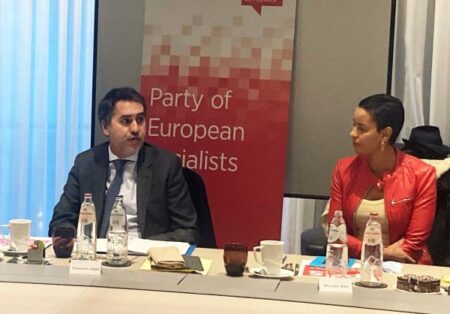We witness a deterioration of global food security as a result of Russia’s aggression against Ukraine: disrupted supply chains, shortages of agricultural supplies, and speculation on the markets which add up to the already alarming global food security situation brought about by the COVID-19 pandemic, climate change and other global challenges. These developments already have severe consequences on developing countries and are likely to lead to the biggest hunger crisis since World War II.
To accelerate the transition towards sustainable food systems, we support agroecology and other sustainable approaches, with special attention to women, youth and small-scale farmers. By strengthening local food production, we can mitigate the dependency on food imports.
We are committed to a joint effort in order to counter the looming catastrophe:
Firm European solidarity and efficient and effective coordination of all our efforts is crucial to tackle the food crisis. We commit ourselves to closely cooperate on EU level and beyond, notably with the United Nations as well as the Global Alliance for Food Security launched through the G7.
- We fully support Ukraine in restoring its export capacities which have been dramatically reduced due to Russia’s blockade of its Black Sea ports. We help Ukraine reorganising its logistics and supply chains and adapt its infrastructure in order to widen its chances to assume its role as a key supplier of grain, wheat and oilseeds to many countries in the world. In this regard, we welcome the actions undertaken by the EU, particularly the recent adoption of an EU Action Plan for EU-Ukraine Solidarity Lanes which is already helping Ukraine resume its agricultural exports. We also welcome the high-level agreement with Ukraine for updating the indicative maps for the Trans-European Transport Network, which will further strengthen Ukraine’s infrastructure connections.
- We will promote concrete EU initiatives aimed at overcoming the negative impact of Russia’s aggression against Ukraine in low-income countries, particularly in the MENA region and Africa. We need not only an emergency response but also a medium- and long-term perspective in order to support our partners in building more resilient and sustainable agricultural and food systems as well as more resilient supply chains.
- We are committed to the ongoing strategic dialogue with our international partners, starting from the commitments of the EU-AU Summit. We support the EU’s approach to continue to closely monitor the situation and adapt respective policies to address the consequences of inflation and price increases in our partner countries. As social democrats, we will muster the strength of our network to ensure that no one is left behind.
We understand that solutions need to be fast in order to address this crisis before it is too late. We are equally aware that the solutions we adopt today must provide long-term benefits in terms of sustainable development. We can and will do more to coordinate within our network, represent our common understanding in our respective EU and domestic processes, and advance progressive development policies.
We condemn in the gravest manner Russia’s aggression against Ukraine and the obvious grievous human rights violations committed by Russian troops. We stand with Ukraine!
Network meetings are also regularly attended by European Commissioner for International Partnerships, Jutta Urpilainen.
- Francisco Andre, Secretary of State for Foreign Affairs and Cooperation, Portugal
- Meryame Kitir, Minister for Development Cooperation, Belgium
- Flemming Møller Mortensen, Minister for Development Cooperation, Denmark
- Ville Skinnari, Minister of Development Cooperation and Foreign Trade, Finland
- Svenja Schulze, Minister for Economic Cooperation and Development, Germany
- Marina Sereni, Deputy Minister of Foreign affairs, Italy
- Franz Fayot, Minister for Development Cooperation and Humanitarian Affairs, Luxembourg
- Ian Borg, Minister for Foreign and European Affairs, Malta
- Pilar Cancela Rodríguez, Secretary of State for International Cooperation, Spain
- Matilda Ernkrans, Minister for development cooperation, Sweden
- Udo Bullmann, Representative of the S&D Group, European Parliament
- Giacomo Filibeck, Deputy secretary General, PES



